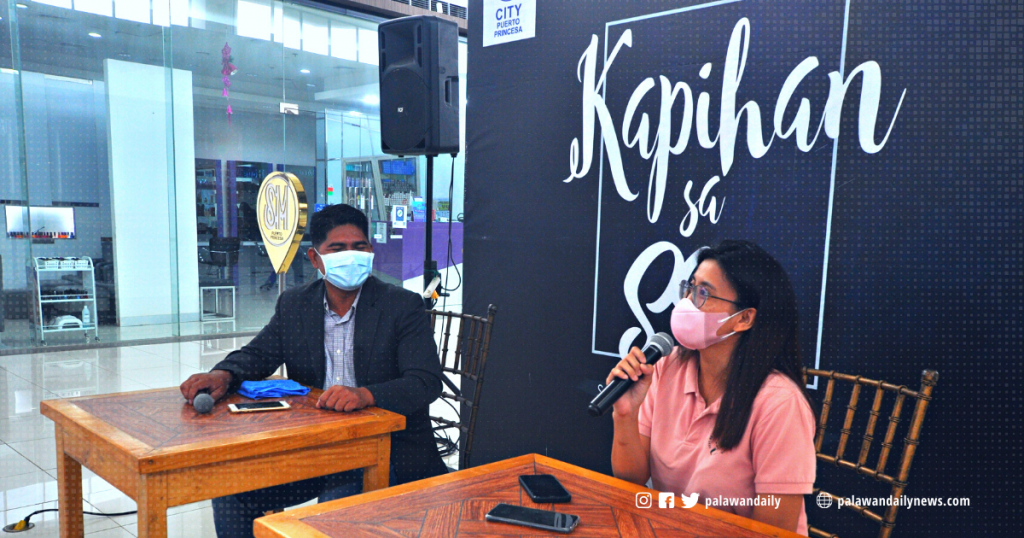In observance of the Women’s Month, the Roots of Health discussed Reproductive Health Education during the Kapihan sa SM on March 30, held at SM Puerto Princesa.
The Philippine Information Agency (PIA) conducted a press conference titled “Kapihan sa SM” with Roots of Health-Ugat ng Kalusugan, represented by Aika Pagusara, Youth Advocacy Manager, who spoke about reproductive health and empowering women.
Pagusara shared their campaign about fighting the increasing cases of teenage pregnancy, HIV cases as well as women empowerment by providing free access to contraceptives, adolescent sexual health, and reproductive health education in the communities and schools in Palawan.
She also added that before the organization implemented the advocacy, Palawan had one of the country’s highest fertility rates, which they think needed urgent help.
“Nakita po kasi sa data na tumataas po… ang mga teenage pregnancy o ‘yong mga kabataang babae na maagang nabubuntis,” said Pagusara during the press conference.
According to Palawan Provincial Health Office data provided by Roots of Health, 4,399 were the highest cases recorded of teenage pregnancy from 2012 to 2020 in Palawan. It dropped in 2017 to 2,724 but rose again in 2019.
While there are 668 highest HIV cases recorded in the province from 2014 to 2021, both are the highest in MIMAROPA.
Women Empowerment vs Misconception
As stated by Pagusara, it is a common misconception when talking about women’s empowerment; men became unassociated. She explained that women had been treated as “second-class” citizens long ago. To implement their advocacy of empowering women, they have to put a mechanism that does not mean disregarding men’s rights.
“Gusto ko lang po ito klaruhin kasi maraming nagsasabi na ‘bakit women lang?’ ‘bakit hindi naman yung mga lalaki?” said Pagusara. “Yong mga lalaki naman… madalas na hindi sila nagrereport na na-rape sila or something kasi nga mayroon tayong biases na kapag lalaki ka, dapat malakas ka. Medyo marami pa tayong dapat lakbayin para maabot talaga natin ‘yong pagkakapantay-pantay pagdating sa karapatan,” she added.
Discrimination vs Women
Pagusara also shared their experiences with women who, until now, have experienced discrimination from their partners. According to her, the common situation is the lack of self-decision of women for themselves or lack of support from their partners in using contraception.
“Mostly na naeencounter po namin ay ‘yong mga kababaihan na hindi po pabor yung kanilang partner na sila po ay gumamit ng contraception,” said Pagusara. “We always make sure na siyempre dapat empowered ‘yong babae kasi parati naming sinasabi na sila yung nabubuntis… una sa lahat dapat kalusugan ang isipin natin ng kababaihan kasi hindi maganda ‘yong parating nabubuntis,” she added. She also said that they always remind their client “to talk to their husbands about health”
What “empowered” means
The advocacy manager also defined “being empowered” as someone who sees their rights and can make decisions based on what they think is the best for them and helping others to do the same to make a better community.
“Matatawag mo talaga na empowered ang isang babae kapag well-informed siya sa mga decision. And kapag naipaglalaban niya kung ano ‘yong karapatan niya… and kapag natutulungan niya rin ‘yong mga kasamahan nya sa community na umunlad,” said Pagusara.
As the organization puts its efforts into providing comprehensive sexuality education, its goal is to change one’s behavior, especially when practicing safe sex.
“Ini-expect talaga namin na sana ay magkaroon sila ng health-seeking behavior… sana once na bigyan natin sila ng information, they themselves can decide kung ano ‘yong para sa kanila na makakatulong para sa kanila para maging malusog sila,” she said.
Protecting Women and Children from Sexual Abuse
When asked how to avoid sexual abuse and gender discrimination, she answered, “Actually, dapat simulan siya sa mga kalalakihan.”
She explained that people should not blame victims of abuse but the perpetrators who did the crime.
“Parati nating sinasabi na dapat ang mga babae ay marunong protektahan ang sarili niya, pero hindi ba natin tinanong na, paano naman yung mga perpetrators talaga?” Pagusara stated.
Instead of victim-blaming, she said, women should not place the sole responsibility to protect themselves but should inform everyone what is wrong.
“Dapat lahat ay mainform na ‘mali ito’, ‘mali ang manakit ng babae’, ‘mali ang mang-rape’ ng kahit sino,” Pagusara stated.
The speaker also discussed other topics such as HIV awareness and basic information, avoiding stigma by teaching a child the proper names of the private body parts, the common misconception about sex that makes it a taboo topic, and the importance of consent between teenage couples.
In her final message, Pagusara said she hopes that celebrating Women’s Month will not only end every March.
